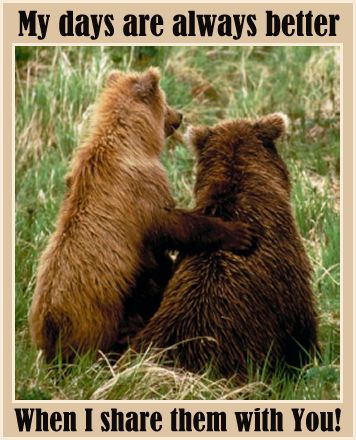Bears are out and about again, but feeding them is no favor.
May 06, 2007
Pennsylvania's 15,000 black bears are awake from hibernation. And they're hungry. Population growth means bears and people are coming into contact more often.
Mark Ternent, Pennsylvania Game Commission black bear biologist, said that bear sightings are common at this time of year.
Food is scarce for bears until vegetation leafs out. Meanwhile, don't let your backyard become a bear buffet.
Act now to keep bears from becoming a nuisance all summer.
Bears that wander near homes are less likely to stay
or return if they don't find food. If they can feast
on your garbage or bird feeders, they'll be back.
Then encounters between humans and bears increase, as
does property damage, risk of human injury and vehicle accidents involving bears.

To avoid bear problems:
Don't feed wildlife. Food placed outside for wildlife, such as corn for squirrels, may attract bears.
Even bird feeders can become "bear magnets."
Feeding birds during the winter is not a problem, but at other times of the year you run the risk of attracting problem bears.
If you do choose to feed songbirds during the summer,
Audubon Pennsylvania offers some tips,
including: avoid foods that are particularly attractive for bears,
such as sunflower seeds,
hummingbird nectar mixes and suet;
bring feeders inside at night; or suspend feeders from high crosswires
so they are at least 10 feet above the ground and 4 feet
from anything a bear can climb, including overhead limbs.
In 2003, a regulation prohibiting the feeding of bears went into effect. The regulation made it unlawful to intentionally "lay or place food, fruit, hay, grain, chemical,
salt or other minerals that may cause bears to congregate or habituate an area."
The intent is to reduce bear-human conflicts.

Don't put out garbage until pick-up day; don't throw table scraps out back;
don't add fruit or vegetable wastes to your compost pile;
and clean your barbecue grill regularly.
If you have pets and feed them outdoors, consider
placing food dishes inside overnight.
Encourage your neighbors to do the same.
Keep your distance. If a bear shows up in your backyard, stay calm.
Shout at it like you would to chase an unwanted dog.
Don't approach it.
If the bear won't leave, call the nearest Game Commission
regional office or local police department for assistance.

Eliminate temptation. Bears that visit your area are often drawn there.
Neighbors need to work together to reduce an area's appeal to bears.
Ask area businesses to keep dumpsters closed and bear-proofed (chained or locked shut).
If your dog is barking or cat is clawing at the door
to get in, try to determine what has alarmed your pet.
But do it cautiously, using outside lights to full advantage
and from a safe position, such as a porch or an upstairs window.
All unrecognizable outside noises and disturbances should be
checked, but don't do it on foot with a flashlight.
Black bears blend in too well with nighttime surroundings,
providing the chance for a close encounter.
Prevention is key:
Capturing and moving bears that have become habituated to humans is
a costly and sometimes ineffective way of addressing the
problem, especially when faced with the possibility of
merely moving a problem bear from one area to another.
That is why wildlife agencies tell people that a
"fed bear is a dead bear."

If you encounter a bear:
Stay calm.
If you see a bear and it hasn't seen you,
leave the area calmly.
Talk or make noise while moving away to help it
discover your presence.
Choose a route that will not intersect
with the bear if it is moving.
Get back. If you have surprised a bear,
slowly back away while talking softly.
Face the bear, but avoid direct eye contact.
Do not turn and run; rapid movement may be perceived as
danger to a bear that is already feeling threatened.
Avoid blocking the bear's only escape route and try to move
away from any cubs you see or hear. Don't try to climb a tree.
A female bear may falsely interpret this as an attempt
to get at her cubs, even though the cubs may be in a different tree.

Pay attention.
If a bear is displaying signs of nervousness —
pacing, swinging its head, popping its jaws —
about your presence, leave the area.
Some bears may bluff charge to within a few feet.
If this occurs, stand your ground, wave
your arms wildly and shout at the bear.
Turning and running could elicit a chase,
and you can't outrun a bear.
Fight back.
If a bear attacks, fight back as you leave the area.
Black bears have been driven away with rocks, sticks, binoculars,
car keys and even bare hands.
To report nuisance bears:
Contact the local game commission in your area.
In Pennsylvania contact:
Local game commission at
Northeast Region Office in Dallas, Pa.
(570) 675-1143.

Respect, don't fear:
Bears are misunderstood by many.
"Bears needn't be feared, nor should they be dismissed as harmless.
They simply need to be respected," Ternent said.
He stressed that in the past 10 years, fewer than
15 people have been injured by bears in Pennsylvania,
and there are no known records of a
Pennsylvania black bear killing a human.

Click here for More Real Bear Stories!!



